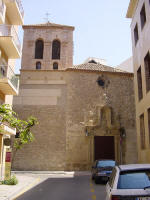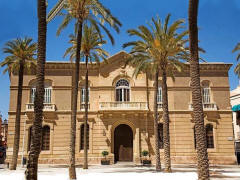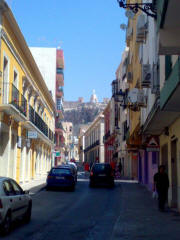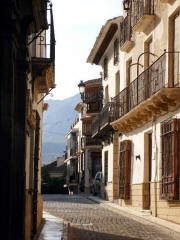|
ALMERIA
Monday, 9 May. We didn't get up until 8:00. We were
already in sight of Almeria, though it was another 90 minutes before the
ship docked. Almeria is capital of the easternmost province of Andalucia.
From our room on the port side we could see the Alcazaba, the huge citadel
overlooking the city. The Citadel dates from the 10th century when Almeria
was an important Moorish port. The Citadel is unusual in that it has three
concentric walls.
Now that we were on the Mediterranean, we could notice the better weather. It was sunny and pleasant, reaching the mid-70s by noon. We had decided not to take the ship's excursion here. It was a walking tour, and we chose to walk the city at our own pace. Our friends, Peter and Marie, joined us.
We left the ship just after 10:00 and
walked to the Puerta del Mar to exit the port and enter the city. For a
couple of blocks we
followed the beautiful San Nicolas Salmeron Park, which runs the full
length of the port. Then we turned north into the old city.
Our first destination was the Cathedral (1524), unusual because it was
heavily fortified. My map wasn't the greatest for the irregular streets, and we overshot the
Cathedral. We found ourselves in Al Medina, a very old section with
Moorish roots. There was a lot of construction going on. It appeared that
many people were buying up the old homes and modernizing them.
We
finally found our way back to the Plaza de la Cathedral. Since the
entrance to the Convent of Las Puras was right there, we decided to tour
the Convent first because I expected that to take the most time. We were
disappointed to discover that the Convent (like the Alcazaba and most
museums) was closed on Mondays. We suddenly had a lot more time for other
things than we had expected. The Convent was founded in the late 15th
century, but the present buildings date from the 17th. After a couple of tries, we found our way into the Cathedral, but not through the large doors at the front of the building as one might expect. Those were locked. The only open entrance was from a side street. It led into a large courtyard, and we entered the church itself from there. Just as it was impossible to take in the huge size of the exterior because there was so little open space around it, so it was hard to get a sense of scale on the inside because it was so broken up by partitions, screens, and roped-off areas. The main altar was very ornate, but there was only a very small section for worshipers in front of it.
Leaving the church, we walked inland, passing the Archbishop's Palace across the square from the front of the Cathedral. Just a block away, we came to the City Hall (Ajuntamiento). Across the street were the archives, located in the former House of the Marquesa of Cabra (19th century). Eventually we came to Las Claras Church and Convent (18th century) and a block further on, Plaza Garcia,
We followed the Calle de las Tiendas (Street of Shops) looking for a camera shop where Peter could replace his malfunctioning digital camera. I remembered enough Spanish to ask for and follow directions along the way. We finally found the camera shop just past Plaza Garcia. We were going that way anyway to see the Casa de las Mariposas (with butterflies on the railings around its tower) and San Sebastian Church. Jane and I had originally planned on eating lunch in town to break up our tour, and it was already 12:30. With the Convent of Las Puras being closed, we were far ahead of schedule. I could sense that Peter and Marie were now thinking of getting back to the ship for lunch. I had no objection, but that meant we'd have to move along. Plaza Garcia adjoins the Puerta de Purchena, a much larger square (but no longer a gate) where two main streets merge, the Rambla and the Paseo. We started down the Paseo, planning to visit the Central Market (Mercado Central). We found it without any trouble, but it was under renovation and was completely torn up. We could only see the shell, and even that was cluttered with construction equipment. We continued walking down the Paseo. As we passed the Cervantes Theater (Opera House, 1921), I told the others to go ahead while I went behind it to see the Sanctuary of the Virgin of the Sea, patron saint of Almeria. It only took me a few minutes, but when I got back to the Paseo, they were nowhere in sight. I hurried all the way down to the intersection with the Rambla (about two blocks), but I still couldn't see them. I was concerned because I had Jane's boarding card, so she wouldn't be able to get back on the ship. I rushed back to the Cervantes Theater, and there they were, sitting on a bench waiting for me. They were only a few feet from where I had returned to the Paseo, but it had never occurred to me to look backwards for them. The four of us then walked to the Rambla. This is a marvelous street with such an exceptionally wide divider strip between the lanes that it constitutes a park, running the length of the old city. We followed it for just a block before it ended and we turned into San Nicholas Salmeron Park. That took us back to the entrance to the port. It was just a few minutes before 2:00 when we got back to the ship, just barely in time for the Lido buffet. (The sandwich line stayed open longer.) At 3:15 I walked back into town while Jane relaxed. Peter
was doing the same thing and we left the ship together. Mostly I wanted to
see the old Moorish areas just below the Alcazaba. Peter was going
somewhere else, so we parted ways. I took the Calle de la Reina, which
goes straight through from the port area to the foot of the Alcazaba. Then
I tried to stay on the closest through street to the fortress as I walked
around it in a counterclockwise direction. I did a lot of zigzagging
because it was often hard to tell which was a through street.
For the most part, the houses were pretty much like those we'd seen that morning in the old Moorish sections. The main difference was the hills. I often had to walk up stairs or a steep hill to stay near the Alcazaba. I passed the road going up to the fortress and eventually wound up in a neighborhood past the Plaza del Quemadero on a hill on the north side of the fortifications. Using my well known "unerring sense of direction," I walked the most direct route from there to Plaza Garcia, where we'd been that morning, and I knew my way from there.
A block down the Calle
de las Tiendas, I noticed a sign for the old Moorish Cisterns (Aljibes
Arabes) across the street and took a look. They had been completely
restored and converted into a place for art exhibits. I also took a quick
look at Santiago (St. James) Church (16th century) on the next block.
When I reached Las Claras Church, there was Peter sitting on the front steps, looking at a map. It was a complete coincidence that we met. We walked back to the ship together, stopping briefly in the Plaza de la Constitucion. This square faces the side of the City Hall opposite the one we'd seen in the morning. As we passed the Cathedral, we went around the opposite side than we had before and passed through the Plaza Bendicho with its beautiful gardens. As we approached the ship about 5:00
p.m., we saw one of the tenders upside down on the pier. It had broken
loose during the crew's lifeboat drill, bounced off the ship (taking out a
large section of railing), and landed upside down in the water. The whole
top was crushed in and there was some damage to the hull. As a result, the
Noordam's departure was delayed for more than two hours because it had to
be recertified as having adequate life boat capacity for all passengers and
crew. (It did.) Apparently the inspector had to fly down from the
Netherlands.
Copyright © 2000-2023 DarrellPeck.com All rights
reserved. | |||||||||||||||








